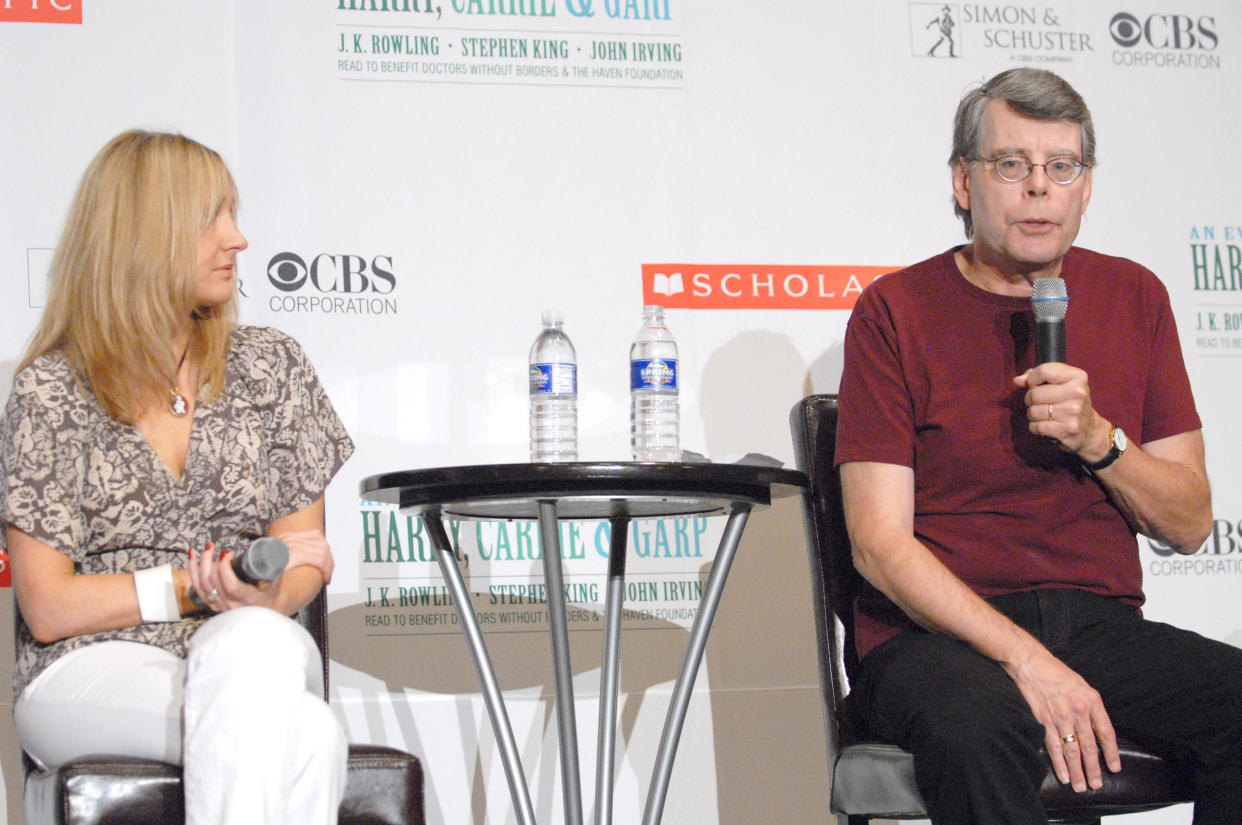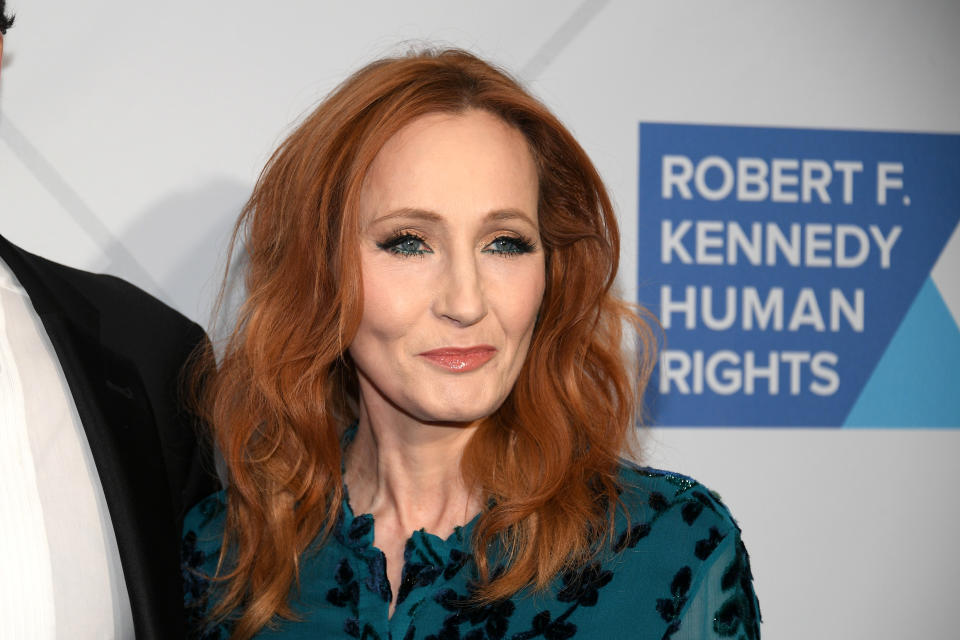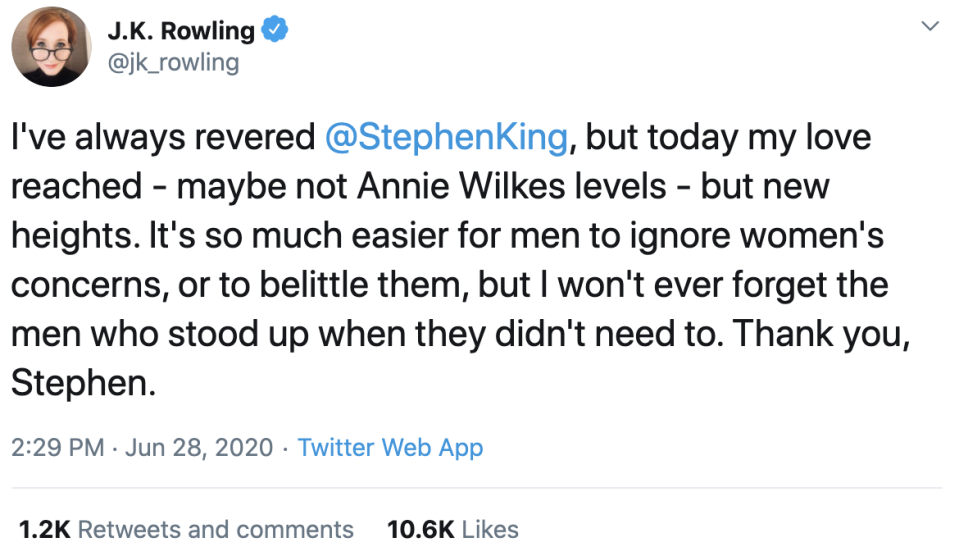Stephen King voices support for trans women after JK Rowling thanks him for retweeting remarks on recent controversy

Aside from sharing drawings from young fans, J.K. Rowling has kept a fairly low profile on Twitter since early June, when she shared an essay defending her controversial statements regarding transgender women. The Harry Potter author sparked outcry — and objection from a number of Potter stars, including Daniel Radcliffe and Katie Leung — after arguing against the idea that biological sex “isn’t real” and calling for a distinction between women and trans women.
“I respect every trans person’s right to live any way that feels authentic and comfortable to them,” Rowling tweeted on June 6. “I’d march with you if you were discriminated against on the basis of being trans. At the same time, my life has been shaped by being female. I do not believe it’s hateful to say so.”
In a follow-up essay responding to accusations of transphobia, the author noted her background as “a domestic abuse and sexual assault survivor.”
Read more: Eddie Redmayne opposes Rowling’s remarks on transgender people
“I’m mentioning these things now not in an attempt to garner sympathy,” Rowling wrote, “but out of solidarity with the huge numbers of women who have histories like mine, who’ve been slurred as bigots for having concerns around single-sex spaces.”

She added, “‘Woman’ is not a costume. ‘Woman’ is not an idea in a man’s head. ‘Woman’ is not a pink brain, a liking for Jimmy Choos or any of the other sexist ideas now somehow touted as progressive. Moreover, the ‘inclusive’ language that calls female people ‘menstruators’ and ‘people with vulvas’ strikes many women as dehumanising and demeaning. I understand why trans activists consider this language to be appropriate and kind, but for those of us who’ve had degrading slurs spat at us by violent men, it’s not neutral, it’s hostile and alienating.”
She added that she found the “majority of trans-identified people” to “not only pose zero threat to others” but to themselves be “vulnerable.”
“At the same time, I do not want to make natal girls and women less safe” by opening up single-sex spaces, such as public bathrooms, to “any man who believes or feels he’s a woman.”
On Sunday — incidentally, the 50th anniversary of the first Pride march in the U.S. — Rowling again returned to the issue, noting that MP Lloyd Russell-Moyle, had publicly apologised for accusing her of “using” her experience with domestic abuse to promote discrimination against the trans community.
Reflecting on Russell-Moyle’s about-face, Rowling shared a quote from the late feminist and writer Andrea Dworkin about how men treat women’s opinions harshly, adding her own view that “it isn’t hateful for women [to] speak about their own experiences, nor do they deserve shaming for doing so.”
Andrea Dworkin wrote: ‘Men often react to women’s words—speaking and writing—as if they were acts of violence; sometimes men react to women’s words with violence.’ It isn't hateful for women speak about their own experiences, nor do they deserve shaming for doing so. 8/9
— J.K. Rowling (@jk_rowling) June 28, 2020
That comment appears to have resonated with fellow author Stephen King, who retweeted it onto his own Twitter feed. The It and Carrie writer didn’t add his own comment, but his retweet was enough to impress Rowling, with whom he has previously bonded online.
The author referenced King’s thriller Misery as she wrote in a now-deleted tweet that her love for him had reached “maybe not Annie Wilkes levels, but new heights.”
“It’s so much easier for men to ignore women’s concerns, or to belittle them, but I won’t ever forger the men who stood up when they didn’t need to,” she added. “Thank you, Stephen.”

However, after being pressed by a fan wanting to know where he stood on the issue, the Shining scribe echoed a statement made by Harry Potter stars Rupert Grint and Daniel Radcliffe and others:
Yes. Trans women are women.
— Stephen King (@StephenKing) June 28, 2020
Rowling’s tweet thanking King appeared to have been deleted after his response to the fan.
Meanwhile, that clarification appears to have appeased some fans, and angered others. Unsurprisingly, the controversy wages on.

 Yahoo News
Yahoo News 

